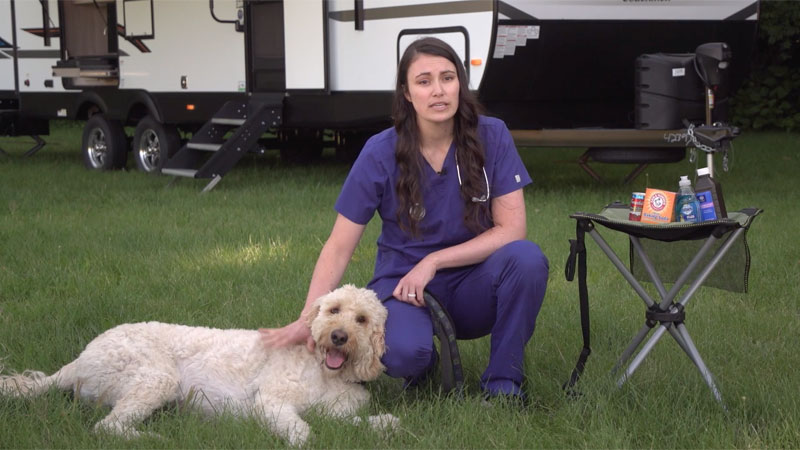rving with pets
Skunk Encounters with Dr. Fitz on 'Paws on Board'
Welcome to “Rollin’ On TV’s” “Paws on Board.” I’m Dr. Fitz, and this is Champ. Today we’re addressing an issue that many RVers face: what to do if your dog encounters a skunk. Although we hope it’ll never happen to us, dogs will generally get skunked at the most inconvenient times. Your dog may encounter a skunk in the evening time at home, as skunks tend to be most active at night.
Campgrounds are also super-common areas for skunk encounters, as they’re usually near the skunk’s home environment and provide an ample opportunity for an evening snack.
 The most common side effect of being sprayed by a skunk is, of course, the smell. But did you know that the spray can actually be dangerous to your pet? If your dog was sprayed in the face, it can lead to severe eye irritation and drooling due to the poor taste. You may see your pet’s eyes become red and swollen, and they may vomit and drool due to the spray in their mouth. If this happens, you can rinse your pet’s eyes with a saline eyewash, if available, or clean room-temperature tap water. Rinse out their mouth with water as well. If this does not provide relief, your pet should be taken to a veterinarian for assessment. If enough of the spray was ingested, it can sometimes lead to anemia or decreased red blood cells, as the spray can be toxic. This is uncommon, but if your pet is lethargic or weak, with pale gums, get them to a veterinarian right away.
The most common side effect of being sprayed by a skunk is, of course, the smell. But did you know that the spray can actually be dangerous to your pet? If your dog was sprayed in the face, it can lead to severe eye irritation and drooling due to the poor taste. You may see your pet’s eyes become red and swollen, and they may vomit and drool due to the spray in their mouth. If this happens, you can rinse your pet’s eyes with a saline eyewash, if available, or clean room-temperature tap water. Rinse out their mouth with water as well. If this does not provide relief, your pet should be taken to a veterinarian for assessment. If enough of the spray was ingested, it can sometimes lead to anemia or decreased red blood cells, as the spray can be toxic. This is uncommon, but if your pet is lethargic or weak, with pale gums, get them to a veterinarian right away.
So what’s the best way to rid your dog of the horrible skunky smell? Many of you have probably heard of using tomato juice, but this method is not very effective. You would need gallons of tomato juice, multiple baths. It would likely end up with a red dog in the end, probably like the Champ here. That’s not working. An easier method is to use about a quart of hydrogen peroxide, a quarter cup of baking soda, and a few tablespoons of a gentle dish soap. Make up the mixture as needed. It should not be stored for later use. Use the mixture to bathe your pet, but take care to avoid their eyes and mouth. You can bathe them with a pet shampoo afterwards to improve the smell even further. Just make sure that you dry your pet well and put them in a warm environment after bathing.
The final consideration you should have if your pet encounters a skunk is rabies. In the US, skunks carry rabies. If your dog decides to challenge a skunk, it’s possible that they could have been bitten. If so, your dog should be taken to a vet to have the wound cleaned and treated and to receive a rabies booster vaccine. Always make sure that your pet is up to date on their rabies vaccine prior to travel to reduce the risk of illness.
For more information about traveling safely with your pets, visit rollinontv.com. Tune in next time for more pet health information.
I ‘m Dr. Fitz, and this is Champ. Thanks for watching “Paws on Board “


